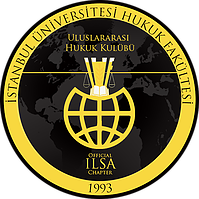
Interviewers: MUHAMMET BEMBEYAZ, ŞEHNAZ TERCAN
Translated by: Elif Naz Karakurt, Yasemin Kaya
Edited by: İlayda Usluer
On our second interview on about Moot Court competitions, we hosted ILSA’s 2013-2014 president, a previous member of our faculty’s Jessup team (Philip C. Jessup International Law Moot Court Competition) and General Public Law Department Research Associate Eren Sözüer,. We had a conversation about his experiences and his opinions on ILSA and Moot Court.
Hello, welcome. Could you talk about your four years in the faculty with regards to ILSA and Moot Court competitions?
Since high school I have always been into extracurricular activities. Back then, I worked at the European Youth Parliament, wrote papers for school newspaper and for school magazines. I am an extrovert person hence it was hard for me to focus on my curriculum. When I first started law school, due to its crowd, its organization and the difficulty of the lessons I drifted from extracurricular activities. On my freshman year, I heard about ILSA and while I was researching about it, I came across its website. I wanted to participate but I couldn’t exactly made contact with them. They organized an activity about informatics, it did not catch my attention so I didn’t continue with ILSA. I didn’t do much in my freshman year. In my sophomore year, I heard that my friend attended a moot court competition, but I haven’t even heard about the selection. At the end of that year, when I saw the announcement about next year’s moot court team elections, I jumped at it, in a manner of speaking. I entered the selection and joined the Jessup team. That is how I became acquainted with Moot Court. My junior year was different then all the others because of the competition. I used to attended most of my classes in my first two years but it has changed since I was mostly focused on the Moot Court. That caused my grades to drop, but of course, I have no regrets.
At the end of the same year, we learned that ILSA faced the danger of closure. According to Istanbul University’s directives, every club must periodically submit an activity report which includes a specified list of the club’s board of directors and board of auditors.
Since this procedure hadn’t been done for two years, the club was suspended and was facing closure. When we heard about this, me and my friends instantly started working to revive the club. Most of the people who helped were from Moot Court teams. We had an election for the board of directors, prepared plans, organized activities and succeeded in reviving the club. On my senior year, I intended continuing with the competitions but couldn’t. Meanwhile I continued to be a part of ILSA as club’s president. I am glad that I took a part in both the Moot Court and ILSA. Well, I didn’t graduate with a 4.00 GPA, but still I had a good GPA. Besides, I wouldn’t change what I had done for the perfect GPA.
When you first joined the Moot Court team, what did it mean to you? What was your perspective towards the competition?
When I first started, I didn’t have a good grasp on the concept. I wanted to use my English be active somehow. Thus, at first my purpose was not improving myself as a legist or being involved in international law.Later, I became aware of the importance of both.
What is your reflection towards it now? In what ways, do you think it contributed to you? What is the position of Moot Court in legal education?
I am not certain what it contributed to my friends but I reckon their thoughts will mostly resemble mine. The lessons we take in the faculty weren’t always tangible for me, especially private law subjects. I had never encountered the execution of it in my life at the time. I knew that it was to become my future job even if I practiced in that area or not. Either way, you should learn it thoroughly. Nevertheless, I couldn’t link the theory with my life therefore I didn’t enjoy most of the lessons. This may be the result of our education system since we only use our knowledge partly on the exams.
Surely there is a cognizance process but it is never like the actual practice. Moot Court steps in at this point, people get to use their knowledge in practice. This experience teaches you what you will be doing in your career in law; writing petitions, determining appropriate legal arguments, using resources.
When you join Moot Court teams, you realize that courses contribute a lot to you especially on your latter years in the faculty. Although you could not be aware of it at that time, the courses aim to give students a way of thinking. That was one of the things that Moot Court made me understand, that we receive high quality education. While getting ready for the competition you realize that you have learned a lot. Additionally, with Moot Court I understood that I love being a legist.
How did it affect your daily life? Did you adjust easily to the preparation period or was it difficult for you?
I have always known my priorities and what I want. I focused solely on my lessons in the first two years. I knew that after graduation, I wouldn’t have the chance to be a part of something like Moot Court however I could have been successful at my classes in anytime; I could graduate within 4 or 5 years it would not matter. Thus, I made Moot Court my priority since I wanted to succeed at it. It is a habit of mine that if I intend to do something, it must be well-done. Not many had the same thoughts as mine, some has different approaches to the subject but I disregarded my lessons immediately. It is a perspective not many would approve of, especially professors, but it felt right at the moment and I still think that way.
Did you feel prepared concerning language aspect?
Language wise yes, but you must think of language in two separate branches; General English and Legal English. I wasn’t sufficient enough regarding at international law terms; I only knew their Turkish meanings. When you enter the competition, you realize that it doesn’t matter, because how much you know won’t would not be enough no matter what, since it requires an enormous amount of knowledge about law and English. So, there is no need to over-think it.
In terms of the position you are in right now at, could can you say that ILSA and Moot Court have an influence on you? Did they it affect the choices that you’ve had made?
Even if I didn’t not participate in Moot Court competitions, I would have become an academician because I have always enjoyed researching, writing and things concerning an academic career. So, I wouldn’t say it had an effect on that but; I can easily say that it had its benefits. For example, I learned researching materials and using them during that time which, now makes it easy for me to write academic papers.
You have an article in Opinio Iuris about the conference which was held in London. Could Can you tell us the environment of the conference?
It was the first of the two conferences which were co-organized by ILSA and IBA (International Bar Association). The speakers were valuable people and the conferences were not only about international law but were also about careers in law, Moot Court and the future of human rights. It was pleasant to be with people who have similar attitudes as yours but the event was short, so there weren’t many chances to meet with people. Still, being with many lawyers from all around the world was a stimulating experience. They are aware of the importance of Moot Court; it is something that can be challenging to explain to others who did not participate in Moot Court.
In addition, I recommend people who are interested in Moot Court participating to check the article in the magazine. We included the precious valuable recommendations of from experienced competitors and coaches who had spoken at the Moot Court workshop.
What was the vision you have observed throughout the conference? Do you think we can as well see it in ILSA and Moot Court? Also you have mentioned in your article that one of the speakers referred human rights as ‘a new global belief system’. We were wondering about this point of view.
This is of course a controversial matter in human rights discipline. We have also seen this in the approaches of speakers to the matter. That was the first session of the very first day. There were representatives of IBA’s executive board, who were passionate about human rights and dedicated to it. To give an example of what they are doing: establishing bars in countries which don’t have any, such as Afghanistan and Tajikistan, reporting countries in breach of human rights, supporting lawyers of those countries etc. There are activist sides of working at this field. At the conference, I saw that vision clearly.
In fact, I also see this in my readings. When you look at the historical development of human rights, it can be said that, this is a discipline which aroused following the liberal ideology of the west(?). Western society was ruled by Christianity for years, until they decided there wasn’t any benefit brought by it. That is why they improved human rights with different philosophical and moral perceptions. Based upon this idea, there are other people who express that this is the new belief system. I agree with this idea as well. After all, law too, has its own ideology and expression. But I don’t think that this vision can be gained by Moot Court. Benefits of Moot Court are more likely to be methodological.
Could you tell us about these methodological benefits? There is serious team work and considerable amount of time spent with the team members. Can we say that Moot Court is useful for developing a working discipline and communication skills?
Definitely. Our education system doesn’t lead us to work as a team and collaborate with other people. It is more focused on individual success. This is where Moot Court creates the difference. You realize that personal effort is not enough. In order to accomplish a result, all team members have to be committed. This can only happen by respecting one another and working as much as the other members do.
Jessup National Rounds were held by our faculty this year and you were in charge of the organization. Can you tell us about the process?
Like every implementation of ILSA, a guide was prepared to enlighten organizers about the continuation of the process. Unfortunately, I had to complete the process within a really limited time, even though the usual preparing process takes months. It was also late when I was offered with this position. By that time, I had other responsibilities and the only way I could accept the position was to start the preparations only two months before the national rounds. Directors approved this condition. Plenty of difficulties showed up because of this timing problem, since the preparations should have started around September. I realized there were a lot more details than I thought there would be. I wasn’t aware of those when I was a contestant.
Rules of competition are very strict and you are the implementer of them. You shouldn’t step out of these rules because people there put so much effort to this competition. You should do your best not to fail all that hard work. I won’t be going deeply into the rules, but besides the timing problem, there was another difficulty; it was the first time that ten different teams had ever participated from Turkey, which meant the hearings needed to be held simultaneously and we needed plenty of judges and staff.
Could you also inform us about who’s judging at the competition? It can give an idea to those who want to be a contestant at the national rounds.
At Jessup, in order to be judge, being an academician is not an obligation. In fact, most of the judges at US national rounds aren’t academicians. Oral part of the competition is more about a show than just presenting mere information. That’s why it is enough for judges to be well-acquainted with Moot Court, Jessup and the rules of the competition. In Turkey, there are academicians and lawyers who show a special interest to the competition. These people also had been a contestant or a coach in the past. They care about this competition so much that some of them get prepared before judging and they all love being here. Plus they are the leading names of their fields.
Could you tell us about the atmosphere of the elimination rounds?
I can tell you about the time when I was a contestant. Organizing is not a very pleasant part. National Round is the time when all of your hard work and months of studying start bearing fruits. It is also delighting to be with people who worked as hard as you did. Competition itself is really exciting but some people can get a little ambitious.
What would you advice to our friends who want to participate to the competition? What are they getting themselves into? How should they look at it?
First of all, this competition shouldn’t be seen as an activity only to add to CV’s.
It might be a source of motivation, even though I don’t approve it. If you change your mind halfway through just because it doesn’t worth for a CV, that would damage the efforts of other team members.In my opinion, people should participate to Moot Court only if they are really interested. Besides, they will see that they love it once they start to get involved in it.
For the preparation stage, my advice to friends who are at the beginning of the faculty is to improve their English. Not legal English but general English. They also shouldn’t abstain themselves because they are not acquainted with international law. I once met the members of a team from Turkey, they were also really helpful throughout the preparation of this year’s national rounds, who managed to achieve the highest level of the competition. They were only 2nd year students of the faculty when they succeeded it. So it was before taking international law classes. That’s why it shouldn’t be seen as a handicap.
First you should make a research on the format of the competition, apply after you become aware of what it is about. This is essential if you are really interested with the competition, Jessup has a wide resource about this subject. Website of ILSA also contains videos from Jessup and preparation guides for the competition. I think a good research about these subjects would contribute a lot to your interviews. Jessup is a very rooted competition and rules are very extensive. This year it has been organized for the 56th time. All of its procedures are defined.
The most important advice I can give is that you should do it only if you think you can go all the way until the end. Once the preparation stage starts, you will realize there is a lot to research which gives you a hard time with your other responsibilities. It will get more difficult to follow up your classes and your social life will not be as lively. You have to keep the balance between those. Jessup was my priority but if you are good at timing, this can be easily manageable. The preparation process in abroad is much stricter, you have to spare your entire time on it. I would recommend you to think twice if you can’t sacrifice your classes.
Another problem which could arise is that your team mates might not be equally determined as you are to make it their priority. The result can be a failure while it could be an achievement if all the members perform equally. Succeeding in Jessup is a result of a team work. This is related to the process of the competition.
Finally, is there anything significant about the competition you want to talk about?
With a pragmatic approach, people can question the benefits of this competition. I can say that particularly for those who are planning to be a lawyer, Moot Court experience is absolutely efficient. Especially if there is an accomplishment, it can be a positive aspect throughout the hiring process, so as the lawyers point out. Thus, this is also a practical advantage. It shouldn’t be seen as a waste of time. It is a very pleasant and educative experience. I believe it has improved me in many ways.
Thank you very much for what you have shared with us, we believe it will be very enlightening and informative for our friends.
You are welcome.

